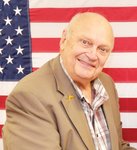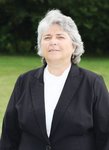


SILER CITY — With most of Chatham County’s economic growth taking place in the northern part of the county, Siler City’s next mayor will be tasked with helping the town get a boost of its own.
John Grimes, the incumbent who has served as mayor since his appointment in 2013 after former mayor Charles Johnson passed away, and challengers Jackie Adams and Albert Reddick each say the town is ripe for growth. But they have differing ideas about how to boost Siler City’s economic fortunes.
The News + Record asked the candidates about economic development in Siler City, the challenges moving forward, and the steps to overcome those challenges.
Economic Development
Each of the candidates for mayor described economic development as a process in which the local government should play a role.
Grimes, a retired Army veteran and co-owner of Cecil Budd Tires in Siler City, said that process is one in which the “economic well-being and quality of life of a community is improved, enhanced and expanded.” He added that local government should “exercise its authority to offer incentives and become engaged in industry partnerships.”
Adams, who owns and operates Oasis Open Air Market in downtown Siler City, noted similarly that economic development is the “progress of an economy” which allows a town to “thrive in a sustainable environment.” She said the government’s role is to investment in quality of life projects and infrastructure, as well as “pro-actively advertis(ing) Siler City as the place to bring your small business.”
Reddick, who directs the nonprofit Becoming One, said economic development happens when the “economic well-being, quality of life and prosperity” of a community are “transformed.” Reddick also noted the importance of economic development’s effect on Siler City’s most vulnerable residents, “28.3 percent who live at or below the federal poverty line.” He said the government should serve as a “catalyst and source of revenue to spearhead economic growth.”
Drawing Business to Siler City
When it comes to attracting new business to Siler City, Adams emphasized that improving “infrastructure, affordable housing and regular communication” with businesses, community leaders and schools would “spearhead changes to better equip” the town for new business growth. She said she believes the town should recruit that “small and medium business(es), technology and industry.”
Reddick echoed Adams’ desires for technology-focused businesses and industries were best for Siler City, particularly those “paying a livable wage.” He also noted that the town government needed to be “honest with its residents about (its) financial stability,” stating the town’s departments are “strapped for operating funds and limited staffing.”
Grimes said “Siler City possesses all the necessary components” for a business to find the town “a fit.” He wants to recruit “well-managed, prosperous, flourishing businesses” that bring “substantial wages and benefits packages” with “low environmental impact.” He added that any business also needs “to be ‘a fit’ for us.”
How to Get There
While candidates generally agreed on most of the overarching principles of economic development, they diverged on some of their specific priorities.
Grimes said he has three goals, the first of which is recruiting businesses that will “utilize our local assets” like the workforce, available buildings and the town’s airport. Secondly, he said he wants to create “opportunities to partner with state and county agencies” associated with economic development. Lastly, he said he desires to promote an “everybody-wins philosophy.” He noted that his main priority was finding an major tenant for the Chatham-Siler City Advanced Manufacturing (CAM) Site located in Siler City.
Adams said she wants to increase the town’s “social capital, working infrastructure, clean and healthy living” to recruit businesses. She also emphasized “working in partnership” with organizations that focus on economic development like the Chatham Economic Development Corporation and Central Carolina Community College. She also wants to “develop a long-term plan and revisit it regularly.”
Reddick’s stated approach is a bit more inward. He said his focus was on developing a “strategic budget that reflects community values and ensures that residents continue to receive a high level of city services.” He said he wanted to “eliminate the current mayor’s $13 million debt” and “allocate resources to needed programs and cutting spending and keeping the tax rates low.”
Siler City Town Manager Roy Lynch said the town has $10,985,411 in long-term debt, with approximately $1 million of that for annual capital leases for equipment and vehicles with the remaining amount for water reservoir loans. Grimes refuted the claim that the town is “going broke” saying that with Lynch’s “extensive background in city finances, Siler City is in excellent financial shape for future job and community growth.”
Final Thoughts
Grimes said that as mayor he would seek to continue his “long-standing relationships” with the town’s elected state and federal representatives and “be engaged with citizens and gather their input.”
“My role is to continue the course we have envisioned for ourselves over the last few years,” he said, “as we are now reaping the rewards of balanced governance, dynamic partnerships, and an engaged community.”
Reddick touted his desire to “spend 90 percent of my time” leveraging relationships with Chambers of Commerce in and around Chatham County to develop “relationships with major and minor companies to bring quality jobs and industry to Siler City and collaborating with other towns, the county and the state.” He also emphasized his role as “voice for the people,” along with chairing the Town Board and other “ceremonial duties.”
Adams said the office of mayor should work as Siler City’s representative to build community and regional support.
“I will be an active mayor who reflects and listens to the citizens in our educational, municipal, faith communities, civic and local agencies,” she said. “I welcome the responsibility to be a problem-solver and facilitator toward a more dynamic Siler City.”
Siler City residents can begin casting their ballots on October 16 during one-stop early voting. Election Day is November 5.
Reporter Casey Mann can be reached at CaseyMann@Chathamnr.com.